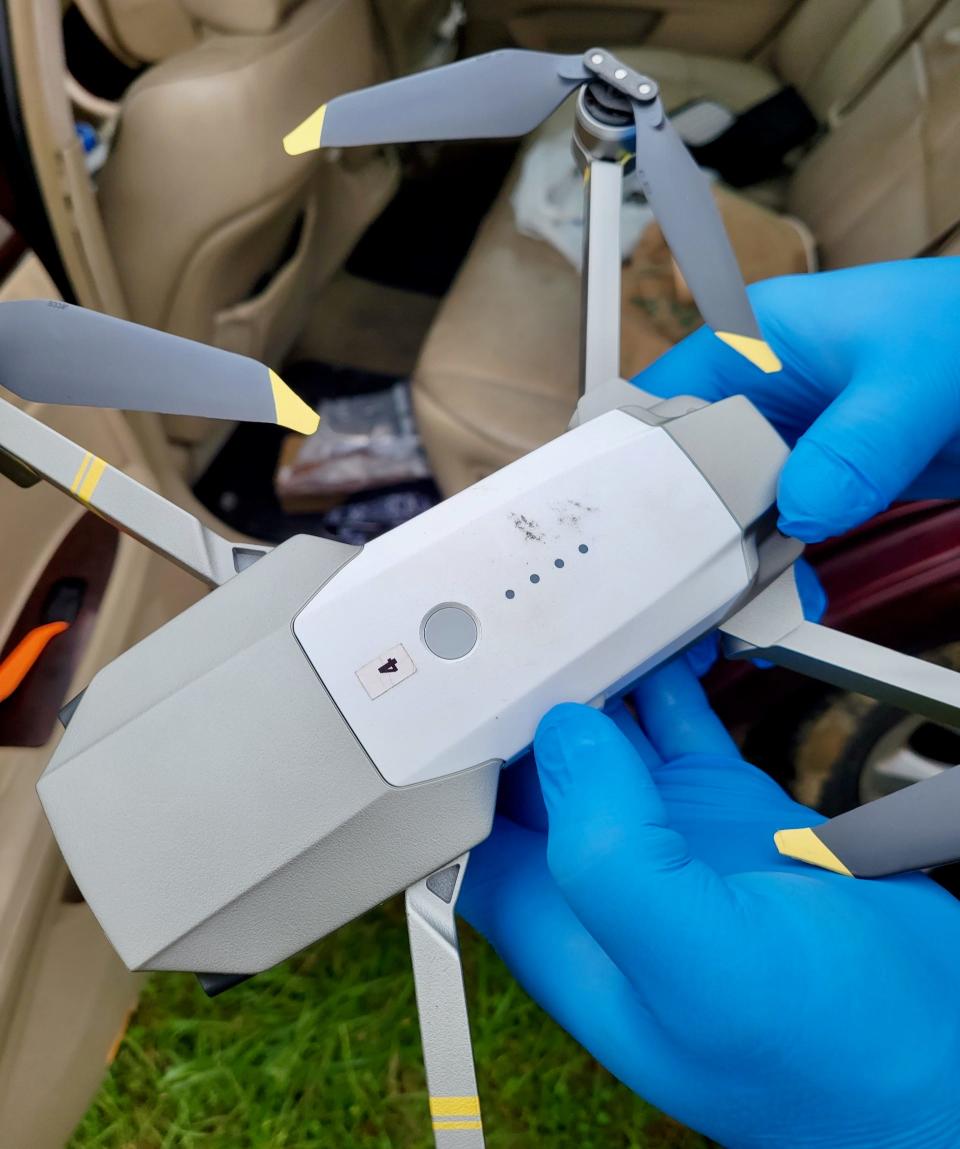State inmate pleads guilty in contraband, ID theft and attempted escape cases
A Maryland inmate was sentenced to 14 more years in state prison after pleading guilty in Washington County Circuit Court on Monday regarding cases involving contraband smuggling at a prison south of Hagerstown, forging documents in an attempt to escape prison, and stealing at least $100,000 from people in an identity theft case.
Jose Tapia, 36, was the last of 15 defendants to plead regarding the contraband smuggling cases at Roxbury Correctional Institution announced in May by the Maryland Attorney General's office. That investigation began in 2022.
More court news: Hagerstown father charged with child abuse resulting in the death of his son
Tapia's case received additional attention and charges when the contraband investigation, which included a wiretap on Tapia's contraband phone in RCI, revealed he was using that phone to commit identity theft and obstruct justice, according to Senior Assistant Attorney General Jared Albert and court records.
Tapia pleaded guilty Monday to one count each of obstructing justice, committing identity theft fraud of at least $100,000, and conspiracy to deliver contraband into a place of confinement. Numerous other charges were dismissed as part of the plea deal.
Albert told Judge Brett R. Wilson that Tapia's role among the recent contraband smuggling conspiracies was "most egregious."
It's one thing to post on Instagram, soliciting people to smuggle contraband into RCI using drones, Albert said.

But Tapia used a contraband phone to repeatedly call health care providers, banks and others, Albert said. Tapia assumed the identity of other people, including disguising his voice. Among his victims were two women in their 80s, the prosecutor said.
The identity theft fraud scheme occurred from January to November last year.
Albert called it "very worrisome" that Tapia, already with a prior conviction for identity theft, was able to obtain social security numbers.
Tapia changed bank account and phone numbers and created email addresses and Cash App accounts, Albert said. He often called financial institutions asking them to send duplicate cards to a changed address. Tapia called a health company, claiming the fax number changed and asked them to fax virtual credit cards, Albert said.
He called hospitals to try to access emails, claiming he couldn't remember his password and needed help to reset it, Albert said.
"This is a disturbing thing," Albert said.
And yet Tapia also tried to undo the administration of justice in October 2022 by fabricating commitment papers stating he was due more credit for time served than he had actually earned, Albert said. That "credit" would have released Tapia from prison, according to Albert and charging documents.
If Tapia had been patient, he was 6 months away from being released legitimately from the state, Albert said.
By "happenstance," Tapia's forged document didn't get him released, Albert said. It wasn't formatted in a way Baltimore City Circuit Court typically sees those documents, he said.
"Fortunately, the Clerk's Office recognized that the commitment was a forgery and did not process his release," a November news release from the Attorney General's office stated.
Wilson went above the active sentence recommended through the plea deal, sentencing Tapia to 14 consecutive years in state prison. Ten of those years were for the identity theft crime.
Albert had recommended 20 years with all but 1 year suspended and to be served at the Washington County Detention Center for the identity theft plea. For the other two cases, Albert recommended consecutive 1-year sentences.
Tapia told Wilson he accepted responsibility for his actions. He said that at age 16 he started taking a narcotic pain medicine stemming from an accident he was in that also took his father's life. He talked about then taking oxycodone and later turning to the streets to self-medicate.
He said, as an addict, he would do anything to get drugs. Later he said he felt he was never going to get the help he needed regarding drug treatment and talked about doing "whatever I had to do" to get to his family.
He admitted harming people, though he said he "didn't do anything intentionally to hurt anyone physically." Tapia said his actions caused "anguish" and "discomfort," and called his actions an "act of survival in certain aspects."
Tapia, according to defense attorney Brian Hutchison, has a wife and three teenage sons in Baltimore County. He also has cancer that Hutchison said causes physical pain.
Tapia asked Wilson to sentence him to the local jail, where he could access a program to help him with his drug and alcohol abuse.
Wilson, in sentencing Tapia to state prison, told him that as a state inmate he could seek a substance abuse evaluation and the possibility of inpatient treatment.
"That is a pretty complex scheme," Wilson said of the identity theft case. Instead of putting his skills to work for legal employment, Tapia "chose ill-gotten gains."
That type of scheme could wipe out someone's savings, Wilson said.
When The Herald-Mail asked the Attorney General's office what, if anything, it had been able to do to assist the identity theft victims, spokesperson Thomas Lester said the office's attorneys reached out and spoke to the victims they were able to contact. He said he could not elaborate further.
Wilson sentenced Tapia to three years for obstructing justice and a year and a day in the RCI contraband case. Wilson noted that the contraband sentence was consistent with other sentencings in the contraband cases.
Tapia was on probation in a federal case at the time of these offenses, Hutchison told Wilson. Hutchison officially represented Tapia in the contraband case, but discussed a global plea with him that included the other two cases.

Fourteen other people were charged in the RCI contraband smuggling cases the Attorney General's office announced in the spring. According to court records:
Temille Anike Ashby, 34, of Windsor Mill, Md., was the only correctional officer among the 15 defendants the Attorney General's office announced in May. Ashby pleaded guilty Nov. 27 to a misdemeanor count of conspiracy to deliver contraband into a place of confinement. Her sentencing hearing is scheduled for May. Ashby was normally assigned to the Jessup Correctional Institution in Anne Arundel County. Her indictment states she was a 10-year veteran dietary officer who occasionally worked overtime shifts in the Roxbury prison kitchen when she helped smuggle drugs and other contraband into RCI. Ashby was on leave without pay, according to a Dec. 5 email from a Maryland Department of Public Safety and Correctional Services spokesperson.
Guy Edward Austin Jr., 26, of Baltimore, pleaded guilty in July to two misdemeanors in the drone conspiracy. Those crimes were conspiracy to deliver contraband and possession of a telecommunications device (a cellphone) with the intent to deliver it to a place of confinement. Austin was sentenced to 5 years with all suspended but 90 days on the telecommunications charge and a consecutive three years suspended for the conspiracy charge.
Miya Ann Scott, 25, of Baltimore, pleaded guilty in July to misdemeanor conspiracy to deliver contraband into a place of confinement. She was sentenced to three years in state prison with all suspended except 1 day. She also received three years supervised probation.
Jamal Brown, 33, pleaded guilty Nov. 27 to misdemeanor conspiracy to deliver contraband into a place of confinement in the conspiracy involving Ashby. Brown was sentenced to 1 year in jail.
A third contraband conspiracy at RCI announced in May involved then RCI inmate Akeem Jamal Banks, who would pick up contraband packages during visits for medical appointments. Outside people would hide the contraband in bathrooms at the University of Maryland Medical Center. Banks would hide the contraband in his clothes, including in a custom-sewn pocket in this underwear, to bring back to RCI, court records state.
According to court records:
Banks, 29, was sentenced to concurrent sentences of two years and 6 months in July after pleading guilty to conspiracy to deliver contraband in a place of confinement and felony possession of fentanyl with intent to distribute.
Jason Tyler Butler, 44, was sentenced to a year in jail on Nov. 27 after pleading guilty to misdemeanor conspiracy to deliver contraband in a place of confinement.
Deven Angel Matos, 30, was sentenced Nov. 6 to concurrent three-month incarcerations after pleading guilty to conspiracy to deliver contraband in a place of confinement and possessing/receiving a cellphone while detained/confined.
Keith Darnell Shuford, 27, of Waldorf, Md., was sentenced Nov. 6 to three years with all but one day suspended, plus three years supervised probation, after pleading guilty to conspiracy to deliver contraband in a place of confinement.
Tracy Lynn Williams, 50, of Brooklyn, Md., was sentenced in July to three years with all suspended except for 77 days after pleading guilty to conspiracy to deliver contraband in a place of confinement. She also was sentenced to thee years supervised probation.
Five other people were charged and pleaded in relation to contraband smuggling cases at RCI that the Attorney General's office announced in May.
This article originally appeared on The Herald-Mail: State inmate pleads in RCI contraband, ID theft and attempted escape

